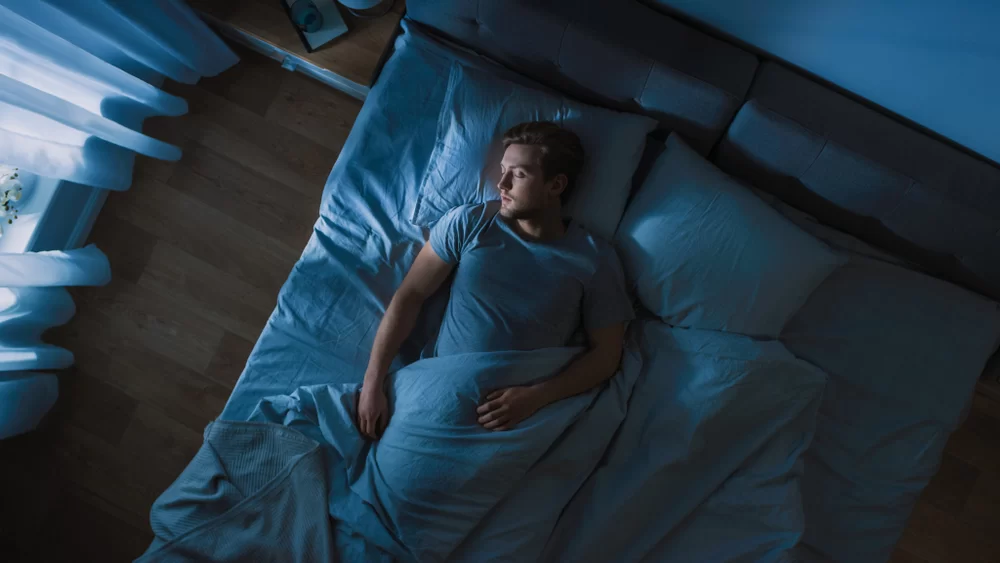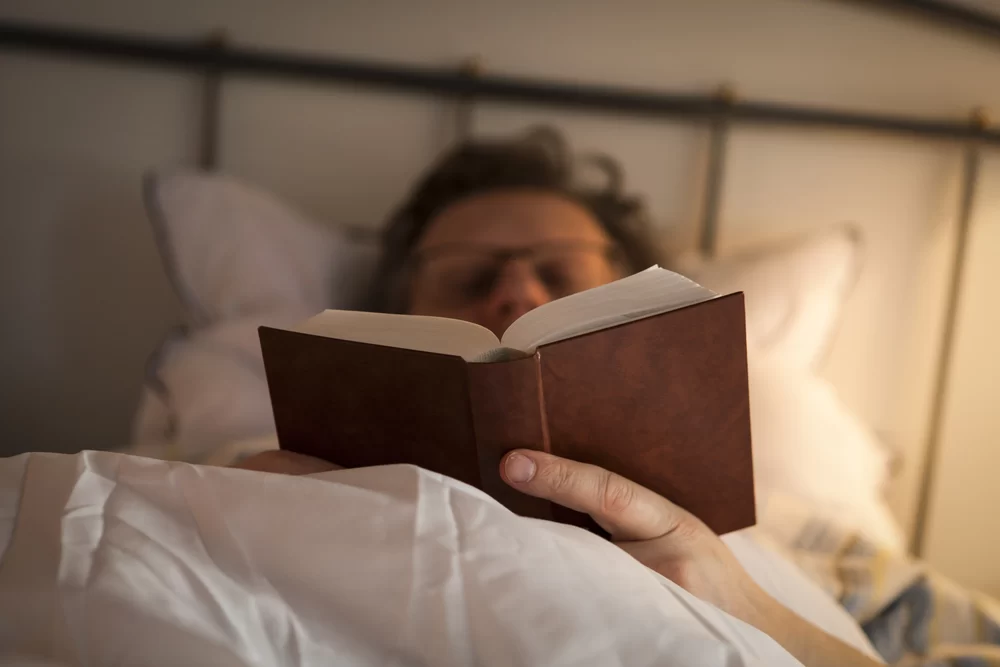How to Go to Sleep Earlier – 7 Tips That Can Help You
03/03/2023

Getting to sleep on time can be difficult, especially if you have a busy schedule. Not only can your mind wander, but it can also be challenging to head straight to bed when you’ve been grinding all day. With that said, getting good sleep can make a massive difference to everything from your health to your productivity.
Since the average adult male needs at least seven to nine hours of sleep per night, you must get to bed on time, especially if you are a night owl or the type that wakes up early. If you’re ready to reset your sleep routine by training your mind and body to go to sleep earlier, we can help.
Here are seven proven tips that can help you get to sleep earlier. It’s time to stop ruining your mornings and days by staying up too late the night before.
7 Tips You Can Use to Go to Sleep Earlier
1. Improve Your Sleep Environment
While it may sound basic, this simple tip is way too overlooked, especially by men. If you put a bit of time, money, and effort into improving your bedroom, you will be able to fall asleep faster.
This does not mean you have to rush out and buy the latest and most expensive mattress. Simply putting up some heavy, blackout curtains can help limit light exposure, which will help initiate your body’s sleep process. When the environment is dark, your body releases a hormone called melatonin, which helps regulate the body’s sleep-wake cycle.
You can also improve your sleep environment by keeping your room cool and quiet. The temperature in your bedroom should stay between 60 and 67 degrees Fahrenheit. This is because a cooler room temperature will reduce your body temperature, which is a natural signal for your body to initiate the sleep cycle.
Earplugs can also go a long way if you can hear external noise while in your bedroom!
2. Establish a Consistent Pre-Sleep Routine

Like any new routine you are trying to establish, having a consistent way of going to bed will help you fall asleep earlier and faster. For starters, establish a set bedtime routine, as this will help your body and mind get into the rhythm of sleeping at that time.
Signaling to your body that it is time to start winding down and preparing for sleep helps to initiate the sleep cycle, which involves the release of melatonin, the sleep hormone we discussed earlier.
You can also help solidify this bedtime routine with other activities that slow down your heart rate, like reading, taking a warm shower, dimming the lights an hour before you go to sleep, or even listening to calming music or a low-energy podcast.
3. Cut Down on Screen Time Before You Go to Bed
Limiting your exposure to screens at least an hour before you go to bed can make it easier to fall asleep on time. The blue light emitted by screens can suppress the production and release of melatonin. As you would expect, this makes it more difficult to fall asleep.
While blue light filters help, they are less effective than switching off the TV, closing the laptop, and putting down your phone. Rather than get sucked into a screen, which will keep you awake longer than planned, read a book or listen to music.
4. Exercise During the Day

Getting adequate physical exercise is one of the most effective ways to fall asleep on time. Physical activity can help reduce feelings of stress and fatigue, which contribute heavily to insomnia. Regular exercise can also help to regulate the body’s circadian rhythm, which is the internal process that controls your sleep-wake cycle.
That said, you must finish your workout at least an hour or two before you plan on sleeping. This allows your body to wind down and for fatigue to set in.
5. Avoid Caffeine and Other Stimulants Before Bed
As you likely know, caffeine helps fight off feelings of fatigue and drowsiness. While the science is a bit complicated, it essentially works by blocking receptors in the brain that absorb the chemical adenosine, which promotes the sensation of tiredness. This can last for three to five hours, so even that after-dinner espresso can prevent you from getting to bed on time.
If you’re trying for an earlier bedtime, avoiding all types of caffeine at least five hours before your preferred bedtime is better.
6. Try Relaxation Techniques Before Bed
While it may sound like nonsense at first, plenty of effective relaxation techniques can help you get to bed on time. Deep breathing, meditation, stretching, and even yoga help calm the mind and relax your muscles.
Try a few different techniques. Once you have found one that works for you, start incorporating it into your nightly wind-down routine.
7. Consider Sleep Supplements and Aids
There are plenty of natural substances that can help you fall asleep. While it is possible to get most of them through the food you eat, having them available in a convenient and concentrated form can help if you are trying to improve your sleep schedule or combat insomnia.
Lights Out Nighttime Sleep Aid was specifically formulated to help you get to sleep faster and experience more restful sleep. L-tryptophan, naturally found in poultry, enables you to fall asleep faster and experience a deeper slumber, while valerian will help improve overall sleep quality.
Other natural and effective ingredients will help you fall asleep faster and stay asleep longer, so you feel refreshed and ready to take on the day. Leave your nighttime struggles behind and start falling asleep when you want to!
For More Information
If you want to know more about getting to sleep on time, we recommend reading How to Fix My Sleep Schedule – Ways to Reset Your Rest. This straightforward guide is packed with helpful information you can use to create a consistent sleep schedule.
We also have another valuable resource for understanding sleep that we highly recommend to any man looking to get the most out of their time in bed – Circadian Rhythm Reset – Understanding Your Body Clock.
Stop wasting your time tossing and turning in bed or staring at the TV when you could prepare your body for the next day. It’s time to get the deep sleep you need to tackle the day.

 Back to Blog
Back to Blog